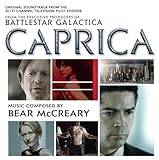
I first discovered his work when he took over for his mentor. Richard Gibbs, as composer for Battlestar Galactica. His work on that series has taken science fiction scoring and the art of television scoring to an entirely new level. If he were scoring features, we'd probably be saying he is taking film scoring to the next level, so it is not that I need to qualify him as a "television composer," the man is an artist. He brings together so many different elements that the final product sounds completely original.
His Battlestar Galactica scores bring together traditional orchestral sounds, strong percussion, ethnic woodwinds, and a myriad other sounds into an utterly beautiful tapestry. In addition to the epic nature of this work, he has shown versatility across the television landscape, having scored Terminator: The Sarah Connor Chronicles and Eureka, each demonstrating another aspect of his talent. Going a step further, McCreary has also lent his skills to direct to video films such as the Rest Stop series and Wrong Turn 2: Dead Ahead. Those films even further demonstrate his ability to take mediocre material and pair it with superior music, just witness the Southern rock in hell atmosphere he creates for Rest Stop 2: Don't Look Back.
That brings me to Bear's score for the pilot episode of Caprica, the Battlestar Galactica prequel. The feature length pilot has arrived on DVD and will make its television debut when the series arrives in early 2010. I am almost embarrassed to say that I have not yet seen the pilot and hope to rectify that in the near future. Fortunately, it does not dampen my enthusiasm for this music, it just means my context will be put straight.
Caprica takes place on Caprica 58-years prior to the fall of the Colonies. It centers on two families, the Graysons and the Adamas, entwined by tragedy and the creation of the Cylon. It is science fiction series, but, from what I have seen, falls more to the dramatic side of the coin. And with a different look at the BSG universe comes a different sound to the score.
Bear McCreary's score is more heavily weighted to the orchestral side, immediately giving us a different look at the world. While stings dominate the score, there are still a few passages that give way to BSG-like percussive cues, most likely accompanying scenes with Cylon involvement. Overall, it is a beautiful, haunting score that will ultimately reward me more when I see the accompanying visuals
The album opens with "The Graystone Family." It is a dramatic, eerie cue led by strings, welcoming you into this new world. It simultaneously tells you that this is not Battlestar Galactica and that what you are about to see is serious business. It is followed by a cue that reminds you this is still a Battlestar Galactica world with its use of percussion alongside the strings, it is called "Terrorism on the Lev."
"Grieving" is a somber cue that is haunting, beautiful, and speaks of a great and tragic loss. It is subtle, but one of the more beautiful cues on the album. It is followed by another subtle cue, only this time it is not loss, but foreboding dread. "Lacey and Zoe-A" is an interesting piece that strikes me as a cue intended to build a relationship, but also point towards danger ahead.
Four tracks in and four different feels. Everything works together in perfect concert as a complete whole, but you are taken on a ride. I never cease to be amazed by his ability draw me in and hold my attention. I am very interested to see what he could do on the big screen, you have to know it is going to come sooner or later, much like another rising star: Michael Giacchino (who came to my attention with his work on Alias and Lost).
Bottomline. I could continue on down the list of cues on the album, but where is the fun in that? Let me just say that his work is wonderful. He covers the range of emotion, he is not hampered by adhering to any expected style, and knows when to cut loose and when to reign it in. Even if you are not interested in the show but have a love for scores, this is one you will want for your collection.
Highly Recommended.

